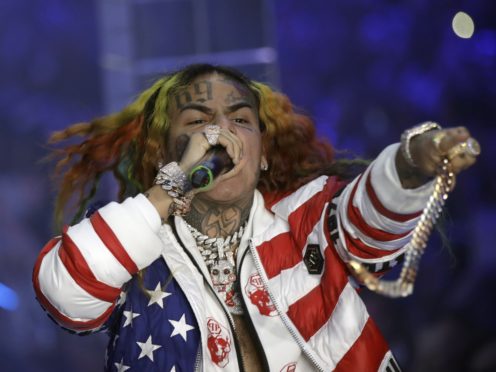Rapper Tekashi 6ix9ine has been sentenced to two years in prison for his entanglement with a violent US street gang.
But he was spared a much harsher possible sentence because of his decision to become a star witness for prosecutors.
The 23-year-old performer, whose real name is Daniel Hernandez, could have been sentenced to decades in prison for crimes that included orchestrating a shooting in which an innocent bystander was wounded.
He pleaded guilty earlier this year to charges accusing him of joining the gang known as Nine Trey Gangsta Bloods.
He has already served 13 months and will be released in late 2020.
After his arrest, he shed the outlaw reputation he had curated online and gave evidence against his gang mates earlier this year, causing some to label him a “snitch”. The evidence helped get the convictions of two high-ranking Nine Trey Gangsta Bloods members.
US district judge Paul Engelmayer said: “Your co-operation was impressive. It was game changing. It was complete and it was brave.”
But the judge said the amount of time the rapper has spent in prison was not enough for the violence of his crimes. He noted that many artists sing about organised crime, citing Bruce Springsteen’s Murder Incorporated.
“You, Mr Hernandez, essentially joined Murder Incorporated,” Mr Englemayer said.
Prior to his sentencing, Tekashi 6ix9ine expressed regret for joining the gang, apologising to his family, his fans and the victims in the case.
He said: “I’m not a victim. I put myself in this position from day one.”
The rapper broke down in tears shortly after when he spotted his biological father, whom he says he has not seen since he was at school, in the courtroom.
He then read from a lengthy letter, saying: “I made a lot of bad choices in life, but that does not make me a bad person.”
He expressed similar remorse for his actions in a letter he wrote last week to Mr Engelmayer, discussing the relief he felt when he was arrested and his plan to make amends by warning others not to follow in his path.
“I’m happy that the public was able to witness me dealing with the consequences of my actions because I feel like it sheds a light on what can come from gang affiliation,” he wrote.
In a pre-sentencing letter to the judge, prosecutors said his “co-operation was extraordinary” and was “both incredibly significant and extremely useful”, enabling them to charge additional individuals. His February 1 guilty plea prompted nearly all of the other defendants to begin plea negotiations, prosecutors said.
“The government believes that his co-operation was not only substantial, it was extraordinary,” assistant US attorney Michael Longyear said at the hearing, noting the risks Hernandez and his family faced for his evidence.
Prosecutors have described Nine Trey as one of the most violent strands of United Bloods Nation, with members throughout the country. Tekashi 6ix9ine relocated his family before his co-operation became publicly known and then he was moved to a different prison and a unit with no gang members, the government said.
His co-operation might make him eligible for a witness protection programme, though his distinctive facial tattoos — including a large “69” on his forehead — could make concealing his identity challenging.
“There is no question that the defendant’s life will never be the same because of his co-operation in this case. He and his family will have to take extra safety precautions when being in public so as to avoid potential reprisals from others,” prosecutors wrote in the letter.
Last year, he had a hit song Fefe, with Nicki Minaj, which reached the top 5 in US charts.
Tekashi 6ix9ine was repeatedly trolled during the trial by rappers like The Game and Snoop Dogg, who wrote on Instagram that he was a sellout.
